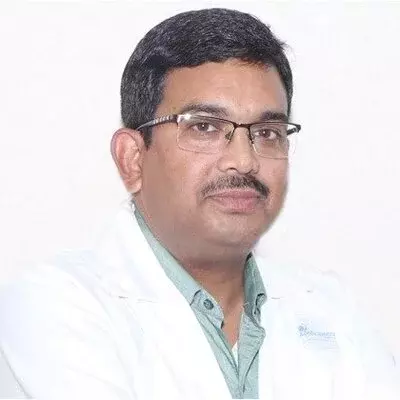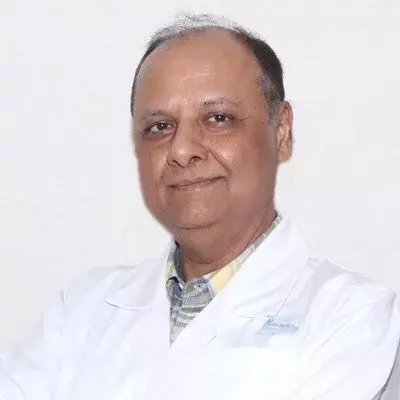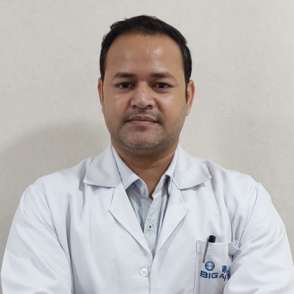General & Laparoscopic Surgery

As a leading hospital in India, we specialize in providing general surgery with our exceptionally talented best laparoscopic surgeon in Patna Bihar. You can visit Big Apollo Spectra Hospital for General Laparoscopic Surgery in Patna.
General surgery is a vital medical specialty that encompasses a wide range of surgical procedures. It focuses on diagnosing, treating, and managing various surgical conditions affecting the body's organs and structures.
A laparoscopic surgeon at Big Apollo Spectra Hospital in Patna possesses expertise in performing surgeries related to the abdomen, including the digestive system, as well as procedures involving the breast, head and neck, blood vessels, and more.
Their skills span treating diseases, injuries, deformities, and other conditions. With their extensive training and experience, general surgeons play a crucial role in providing essential surgical care, ensuring patients receive the necessary treatment and support for optimal health and well-being.
What are the surgical procedures in Big Apollo Spectra Hospital- super specialty hospital in Patna?
1. Appendectomy
Appendectomy removes the inflamed appendix due to appendicitis, characterised by abdominal pain, nausea, and fever.
Prompt surgery prevents ruptures and complications. Minimally invasive laparoscopy with small incisions and specialised instruments is commonly used. It is vital to address appendicitis and ensure a smooth recovery.
2 .Cholecystectomy
Cholecystectomy becomes necessary when cholecystitis or complications from gallstones occur. It can be performed through open surgery or minimally invasive laparoscopic techniques, using small incisions and camera guidance.
Recovery involves a short hospital stay and the gradual resumption of normal activities within a few weeks. Potential risks include bleeding, infection, bile duct injury, or organ injury. Complications like bile leakage or retained stones are possible.
However, most patients find symptom relief and can lead a normal life without a gallbladder, as bile flows directly to the small intestine after the surgery.
3. Hernia repair
Hernia repair surgery addresses organ or tissue protrusion through a weakened abdominal wall, relieving pain and discomfort.
It can be done via open or laparoscopic techniques. Open surgery repairs the area with sutures or mesh, while laparoscopic surgeons in Patna use small incisions and specialized instruments. Recovery involves limited activity for a few weeks, avoiding heavy lifting.
Potential risks include infection, bleeding, hernia recurrence, or damage to nearby structures. Successful surgery improves patients' quality of life.
4. Colorectal surgery
Colorectal surgery treats conditions like cancer, inflammatory bowel disease, diverticulitis, or rectal prolapse. It can be done through open surgery or minimally invasive techniques like laparoscopy.
The procedure involves removing affected colon or rectum portions and reconnecting healthy segments. Recovery may involve discomfort, temporary bowel changes, and dietary restrictions.
Risks include infection, bleeding, leakage, bowel obstruction, or urinary issues. Regular follow-up and post-operative instructions are crucial. Colorectal surgery aims to improve overall health and quality of life by managing underlying conditions.
5. Thyroidectomy
Thyroidectomy is performed for thyroid nodules, cancer, hyperthyroidism, or an enlarged thyroid causing compression or hormonal imbalances. It can be done through open surgery or minimally invasive techniques.
Recovery may involve temporary hoarseness, swallowing difficulty, or hormone changes. Risks include bleeding, infection, damage to nearby structures, hypothyroidism, or voice changes. Regular follow-up and hormone replacement therapy ensure proper recovery and thyroid function.
6. Mastectomy
Mastectomy treats breast cancer, especially when it is aggressive, large, or genetically predisposed. It removes breast tissue, including the nipple and lymph nodes. Recovery may involve pain, swelling, and temporary arm movement limitations. Emotional support is vital.
Risks include infection, bleeding, lymphedema, seroma, and psychological distress. Reconstruction options are available. Post-operative care includes check-ups, surveillance, and adjuvant treatments like chemotherapy or radiation therapy.
7. Laparoscopic surgery
Laparoscopic surgery, a minimally invasive approach, is necessary for gallbladder removal, hernia repair, and abdominal procedures. It uses small incisions, a camera, and specialized instruments, allowing faster recovery with minimal scarring and reduced pain.
Close follow-up care, post-operative instructions, and prompt reporting of symptoms are crucial for a successful recovery. To find out how much laparoscopic surgery cost in Patna, we are available 24/7 on call.
8. LAP BARIATRIC SURGERY (WEIGHT REDUCTION SURGERY)
Laparoscopic bariatric surgery is necessary for individuals with severe obesity to achieve weight loss and improve their health.
It is performed using minimally invasive techniques, reducing incisions and promoting faster recovery. Potential risks and complications include infection, bleeding, blood clots, leaks, digestive issues, vitamin deficiencies, and gallstones.
9. LAP CHOLEcystectomy (GALLBLADDER)
Laparoscopic cholecystectomy is necessary for gallbladder removal in cases of gallstones, cholecystitis, or other gallbladder conditions.
It is performed using minimally invasive techniques involving small incisions and specialized instruments. Also, a stone specialist doctor in Patna, Big Apollo Spectra, helps patients discover gallbladder stone problems.
Potential risks and complications include bleeding, infection, bile duct injury, bile leakage, or digestive problems.
10. LAP HERNIA SURGERY: TEP/TAPP/IPOM/IPOM PLUS
Laparoscopic hernia surgery is necessary for repairing hernias, which occur when organs or tissues protrude through weakened abdominal walls.
It is performed using minimally invasive techniques with small incisions and a camera. Potential risks and complications include bleeding, infection, recurrence of the hernia, or injury to surrounding structures. Hernia is a very common problem; therefore, hernia operation cost in Patna are affordable.
11. LAP PROCEDURE FOR ACUTE ABDOMEN
A laparoscopic procedure for acute abdominal pain is done by the best laparoscopic surgeon in Patna when there is a sudden and severe abdominal condition requiring exploration and potential treatment.
It is performed using minimally invasive techniques with small incisions and a camera. Potential risks and complications include bleeding, infection, organ injury, or complications related to anesthesia.
12. LAP appendectomy
A laparoscopic appendectomy is necessary when the appendix becomes inflamed due to appendicitis. It is performed using minimally invasive techniques with small incisions and specialized instruments.
Potential risks and complications include bleeding, infection, organ injury, or complications related to anesthesia.
13. LAP HYSTERECTOMY: LAVH/TLH
Laparoscopic hysterectomy (LAVH/TLH) is necessary for conditions like uterine fibroids, endometriosis, or uterine prolapse.
It is performed using minimally invasive techniques with small incisions and a camera. Potential risks and complications include bleeding, infection, damage to surrounding organs, urinary problems, or complications related to anesthesia.
Non-Surgical Treatments
1. Endoscopy
Endoscopy is a non-surgical procedure used for the diagnosis, treatment, and surveillance of various conditions.
It is performed using a flexible tube with a camera to visualise and sometimes treat the affected area. Risks and complications, although rare, include bleeding, infection, perforation, or adverse reactions to sedation.
2. Chemotherapy
Chemotherapy is necessary for treating cancer when it has spread or as an adjuvant therapy after surgery.
It is administered through intravenous infusion, oral medication, or injections. Potential risks and complications include nausea, hair loss, fatigue, immune system suppression, and specific side effects depending on the drugs used.
3. Antibiotic therapy
Antibiotic therapy is necessary to treat bacterial infections or prevent their spread. It is typically prescribed when the infection is severe or not resolving on its own. Antibiotics can be taken orally, intravenously, or topically, depending on the infection.
Risks and complications include allergic reactions, antibiotic resistance, and side effects like gastrointestinal upset. .
4. Pain management
Pain management is necessary to alleviate or control pain in various medical conditions or after surgery. It can involve medications, physical therapy, nerve blocks, or alternative therapies.
Risks and complications associated with pain management may include medication side effects, allergic reactions, dependency, or addiction.
Our Specialists

General & Lap Surgery

General & Lap Surgery

General & Lap Surgery